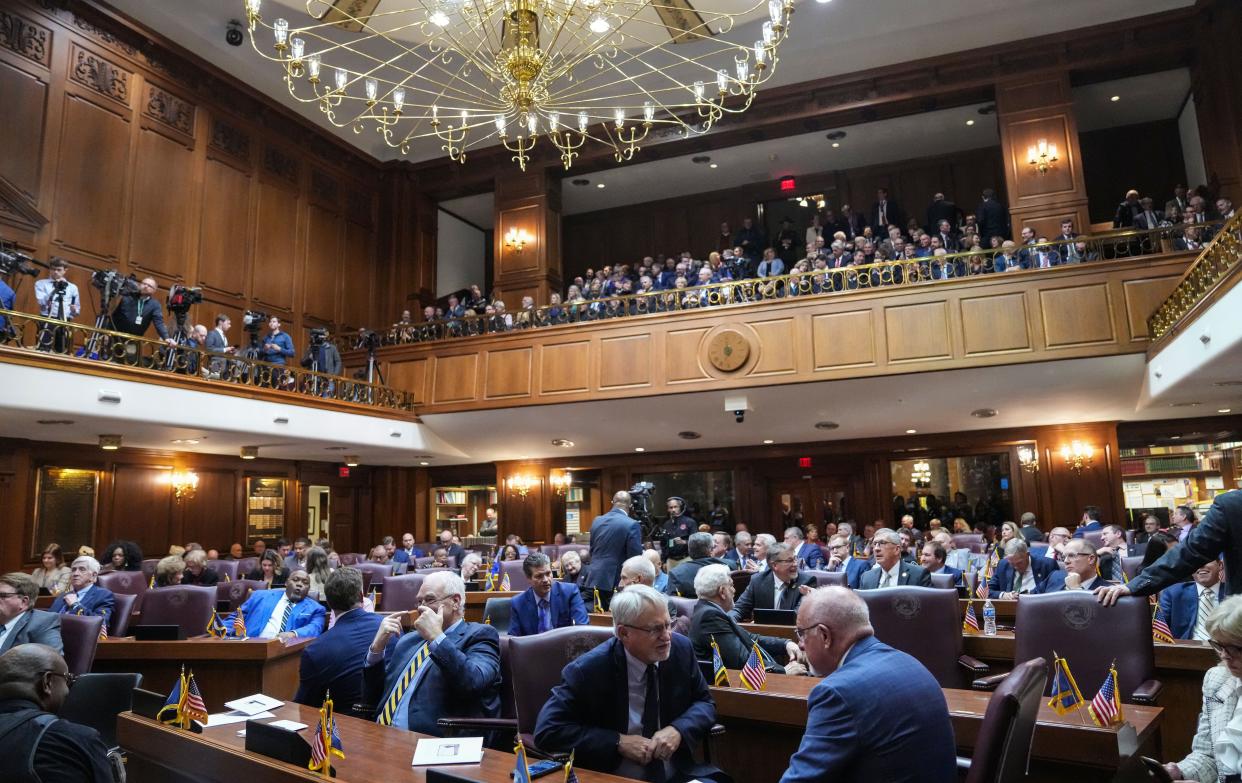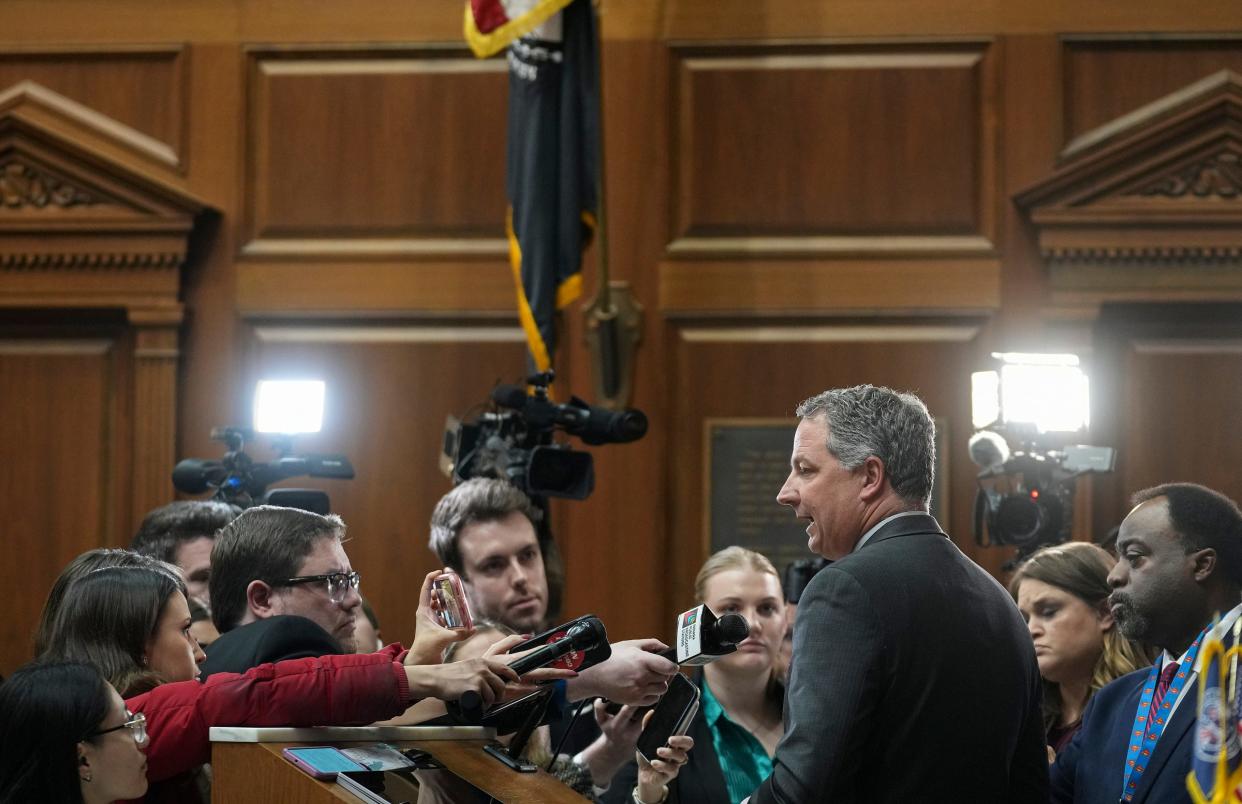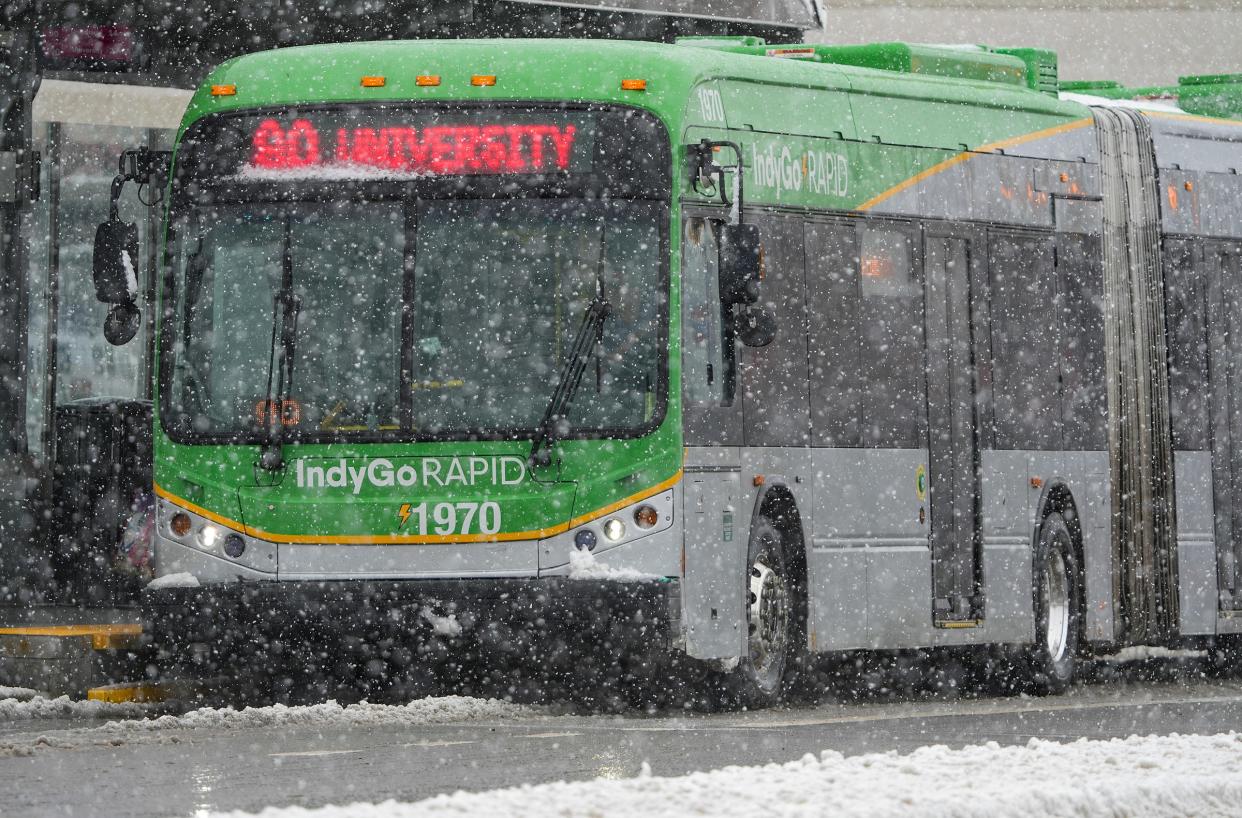Reading, pregnancy, gender: 5 takeaways from Indiana's first week of legislative session
It was a jam-packed first week of Indiana's 2024 legislative session.
Gov. Eric Holcomb gave his final joint address, and state lawmakers set the tone for a quick two months, sharing their key agenda items and diving into a few heavy-hitter bills.
By now, all the bills for the session have been filed, and we have a sense of what's to come. Here are some takeaways from the first week:
Holcomb aligns with Republican leaders on some key issues
Holcomb's priorities aligned with Republican legislative leadership in two key areas: improving third-grade reading literacy and expanding access to child care.
On both of these issues, the Senate is taking the lead with two key bills that are sure to pass in some form.
Senate Bill 1 requires schools to give the IREAD test to second graders ― a year early ― and offer summer school to students who don't pass. Student who fail again in third grade will be held back, with a set of exceptions resembling current exemptions. The bill also requires that the science of reading be taught in kindergarten through eighth grade.
Senate Bill 2 contains much of the recommendations that came out of a summer study committee on child care, including making child care workers automatically eligible for the federal Child Care and Development Fund (CCDF) and state On My Way Pre-K voucher programs, requiring a study of wages in the industry, and lowering the minimum age to be alone with infants or toddlers from 21 to 18.

These other topics will definitely get addressed
Lawmakers have a handful of other priority bills, meaning bills that are almost certain to go the distance:
Antisemitism: The first marathon bill hearing happened Wednesday, lasting about three hours, over a House priority bill that would make antisemitism a form of religious discrimination and condemn it in education settings around the state.
More work-based learning: Lawmakers will tidy up the big piece of legislation passed last year that enables more apprenticeship opportunities for students, but apparently has run into some logistical snags.
Healthcare: There was a lot of discussion last session about how to reduce the need for prior authorizations, the insurance approval process providers undergo before delivering care. Now, a high-priority bill in the Senate would reduce prior authorizations drastically.
Lead pipe replacement:Senate Bill 5 contains language that gives utilities more power to quickly replace all of Indiana's remaining 265,000 lead water lines.

Post-abortion ban bills
While abortion isn't part of leaders' priority agenda, multiple lawmakers filed bills intended to provide support for pregnant mothers ― something they'd promised to think about while passing the near-total abortion ban in 2022. So it's likely that these would at least get discussed.
Senate Bill 98 would allow pregnant mothers to claim their fetuses as dependent children on their tax returns.
House Bill 1024 would require employers to provide reasonable accommodations during pregnancy, following the Americans with Disabilities Act, and to not deny any work opportunities due to a pregnancy.
House Bill 1028 would require state Medicaid to reimburse the cost of giving birth at a birthing center or at home with a midwife, not just at a hospital.
Senate Bill 242 would increase Medicaid reimbursement rates for prenatal care by 44% and for delivery and postnatal care by 10%.
State vs. local fights
The perennial war between Indianapolis and the Statehouse continues. And often, IndyGo gets caught up in the middle.
Downtown taxing district: Last-minute negotiations last session resulted in language added to the state budget that permits Indianapolis to create a special tax to address cleanliness and homelessness downtown. The city created this district a month ago. Now, there's a bill filed to undo it. House Speaker Todd Huston told the Indianapolis Business Journal that he wants the proposal to get a public hearing at the Statehouse, since it didn't last session ― though it did at the local level.
No-turn-on-red: Indianapolis councilors planned to ban right turns at red lights downtown. Sen. Aaron Freeman, R-Indianapolis, got language into a bill prohibiting such an ordinance. Councilors passed an ordinance before the new state law took effect. Now Freeman has a bill that would nullify the ordinance retroactively.
No dedicated bus lanes: A proposal floated in previous sessions to ban the use of dedicated bus lanes in Indianapolis is back. Senate Bill 52 specifically impacts IndyGo's Blue Line bus rapid transit project, since the key federal funding source would be in jeopardy if IndyGo can't include dedicated lanes.
Free and reduced bus rides on Election Day: IndyGo has been offering free bus fare on Election Day for years. So has the transit authority in Louisville, closer to where Sen. Gary Byrne, R-Byrneville, lives. He thinks this is unfair to rural communities who don't have access to public transportation. His Senate Bill 52 would prohibit such a practice across the state.

Some culture-war followups
There are a few bills filed this year that build on discussions over transgender identity and "human sexuality" from last session. Should they get traction, these are sure to be hotly debated.
Human sexuality: Last year, lawmakers passed a law prohibiting the teaching of "human sexuality" from pre-school through third grade, though education leaders said the subject isn't taught in those grades anyway. This year, through Senate Bill 128, they want to require schools to publish information on their websites about which grades above third grade will be taught human sexuality and what materials will be used.
"Obscene" materials: Last year, lawmakers made it a felony for school librarians to have books in their libraries that are "obscene" or "harmful to minors." The existing definitions of these terms in Indiana statute essentially describe pornographic material ― something that "appeals to the prurient interest in sex." This year, in House Bill 1221, lawmakers want to define those terms more specifically, outlining the types of "patently offensive" depictions that would be banned.
Transgender identity: This was a huge topic in 2023, as legislators passed laws regulating the use of alternative pronouns in school and banning certain gender-affirming healthcare for minors. This year, some House Republicans want to codify the use of the term "biological sex" rather than "gender" throughout Indiana law, such as laws that deal with discrimination, benefits and marriage. This indicates that Republicans want state law to recognize only biologically male and female sexes, rather than transgender identities.
Contact IndyStar state government and politics reporter Kayla Dwyer at kdwyer@indystar.com or follow her on Twitter@kayla_dwyer17.
This article originally appeared on Indianapolis Star: Indiana General Assembly: 5 takeaways from the first week of session
